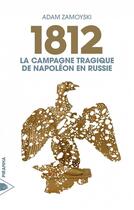-
Nombre de pages : (-)
-
Collection :
(-)
-
Genre :
Histoire
-
Thème :
Histoire
-
Prix littéraire(s) :
(-)
Résumé:
For the ruling and propertied classes of the late eighteenth century, the years following the French Revolution were characterized by intense anxiety. Monarchs and their courtiers lived in constant fear of rebellion, convinced that their power--and their heads--were at risk. Driven by paranoia,... Voir plus
For the ruling and propertied classes of the late eighteenth century, the years following the French Revolution were characterized by intense anxiety. Monarchs and their courtiers lived in constant fear of rebellion, convinced that their power--and their heads--were at risk. Driven by paranoia, they chose to fight back against every threat and insurgency, whether real or merely perceived, repressing their populaces through surveillance networks and violent, secretive police action. Europe, and the world, had entered a new era. In Phantom Terror, award-winning historian Adam Zamoyski argues that the stringent measures designed to prevent unrest had disastrous and far-reaching consequences, inciting the very rebellions they had hoped to quash. The newly established culture of state control halted economic development in Austria and birthed a rebellious youth culture in Russia that would require even harsher methods to suppress. By the end of the era, the first stirrings of terrorist movements had become evident across the continent, making the previously unfounded fears of European monarchs a reality.
Phantom Terror explores this troubled, fascinating period, when politicians and cultural leaders from Edmund Burke to Mary Shelley were forced to choose sides and either support or resist the counterrevolutionary spirit embodied in the newly-omnipotent central states. The turbulent political situation that coalesced during this era would lead directly to the revolutions of 1848 and to the collapse of order in World War I. We still live with the legacy of this era of paranoia, which prefigured not only the modern totalitarian state but also the now preeminent contest between society's haves and have nots. These tempestuous years of suspicion and suppression were the crux upon which the rest of European history would turn. In this magisterial history, Zamoyski chronicles the moment when desperate monarchs took the world down the path of revolution, terror, and world war.
Donner votre avis















